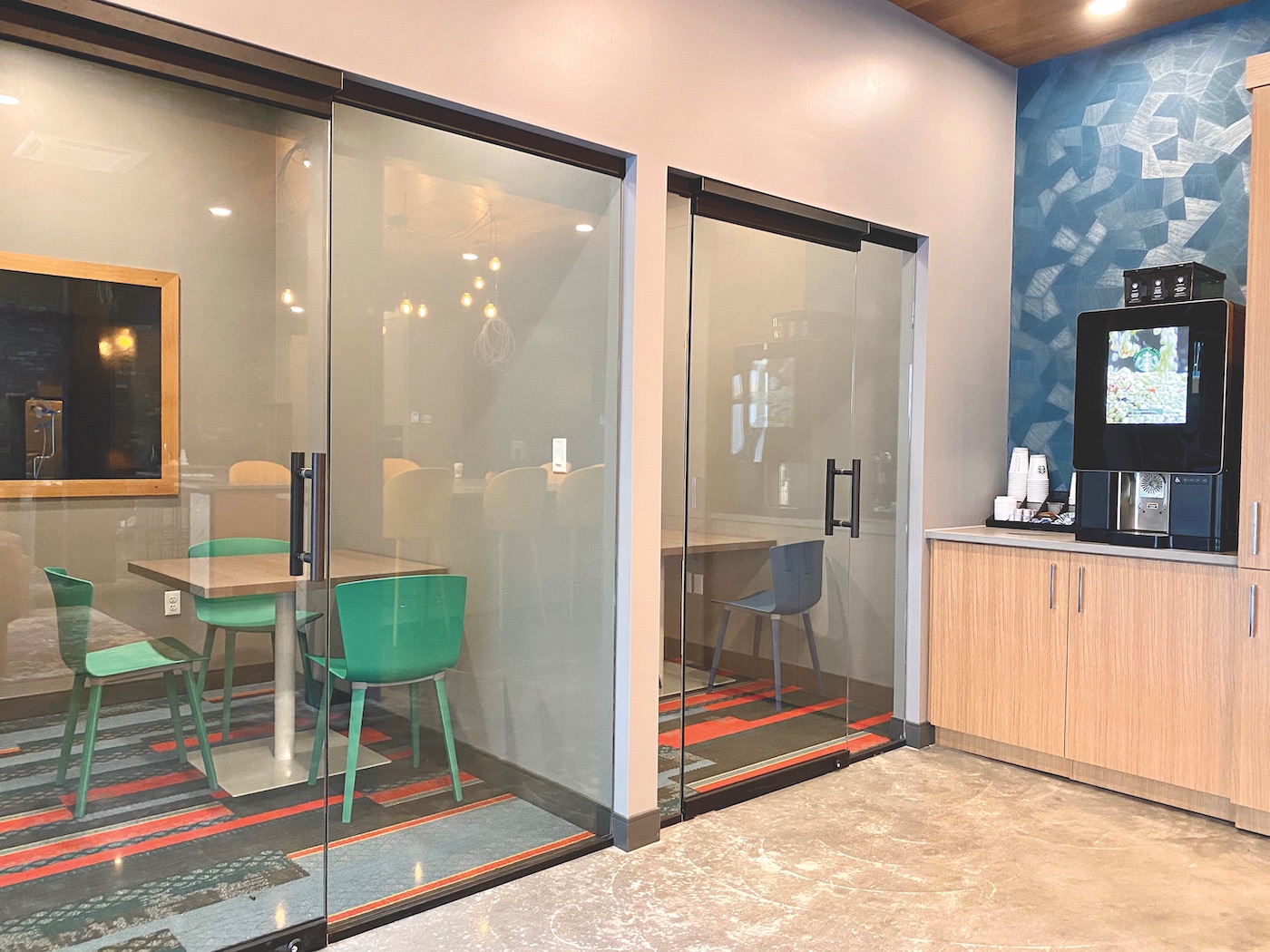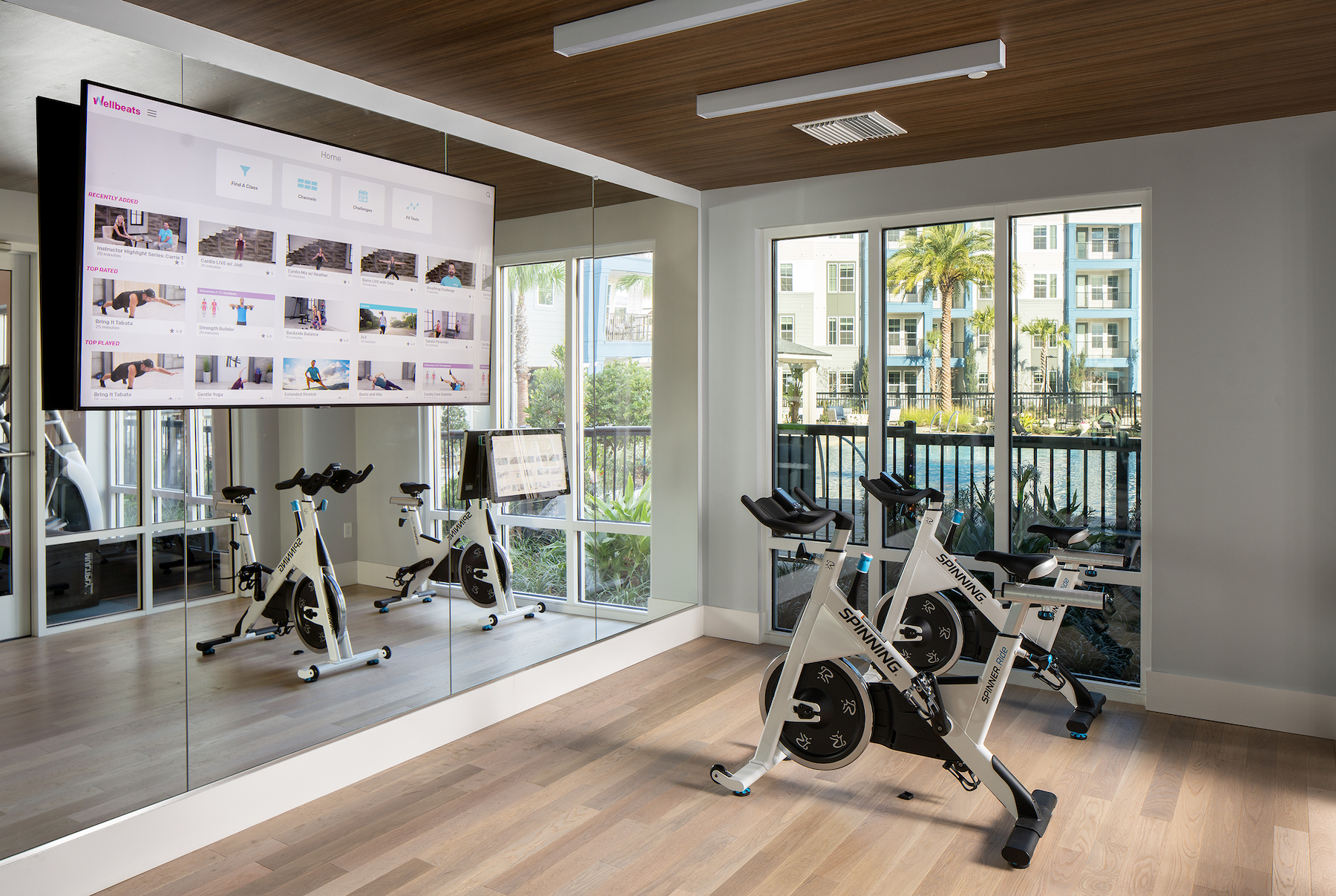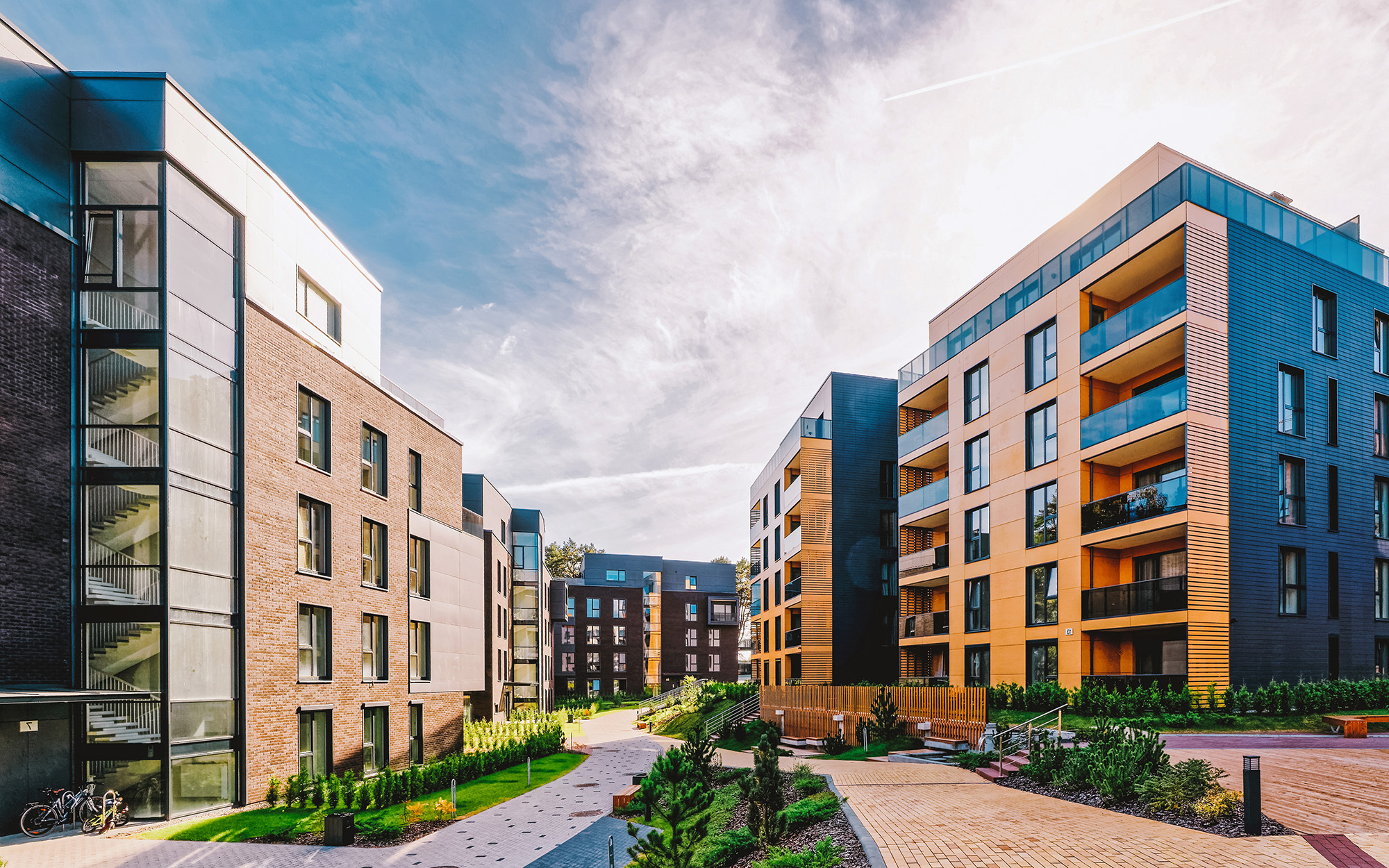Eighty-seven percent of residents consider amenities when signing or renewing a lease. That is, according to market research by Joe Duffus, CEO of Builders Design, and Justin Bucy, director at Housing Design Matters.
Based on market research and trends, Duffus and Bucy shared some primary areas of focus for multifamily amenities during their presentation at the 2023 International Builders’ Show. Whether it’s picking interior design elements or catering to your target demographic, here’s what their research has found.
3 important focus areas for amenities
In order to attract modern tenants, you need spaces that function for their preferred way of life.
1. Remote work
It’s not going away anytime soon. According to McKinsey data, nearly 60% of people work from home at least one day a week.

Remote work amenities could be anything from workspaces to meeting rooms and “Zoom booths.” It could be as simple as having minimalist workstations in a designated co-working space, as long as the design is inviting and functional (high-speed internet is a must). No one wants to sit and look at a blank wall—they can do that at home.
With the variety of careers going fully remote, Bucy has even seen podcasting/recording studios emerge in the multifamily space.
2. Relaxation and personal wellness
Water features, gardens, and meditative spaces can help residents up their relaxation game, making them feel even more at home. Whether it’s a simple outdoor fountain that provides calming white noise, or a tucked-away library for needed quiet time, amenities that promote relaxation can help retain tenants each and every year.
On the other hand, dedicated fitness centers are also essential for resident wellness—but long gone are the days of minimal equipment in a cramped room. Depending on your target demographic, choose between free weights or weight machines (or even both) as long as you maintain adequate, clear floor space. Consider using a fitness consultant to help layout and optimize the room.

Also, keep in mind the various ways people exercise: yoga, stretching, aerobics, etc. If possible, implement space for such alternative activities in your fitness room.
3. Outdoor spaces
Community fire pits/grills, lounging areas, hiking trails, or pools offer residents the chance to socialize day and night. With modern technology, you can implement a simple, sleek fire table that’s both easy to operate and functional in tighter spaces. And don’t sleep on rope lights—they can help define and elevate any outdoor area. Bucy emphasizes the inclusion of covered outdoor spaces as well, citing his firm’s 20% increase in the feature as of late.
Bonus amenity considerations
After nailing these focus areas, Duffus and Bucy suggest improving upon your development further.
- Community cultivation. Look for a chance to create communities with your attractive amenities. Consider your target market and let it influence your design choices. A gathering space could be designed as a bar/lounge for the younger crowd, or as a sleek kitchen-like common room for elegant types. Bucy also sees opportunities for creating community through flex room design. Give it a theme—maybe with wine or scotch lockers—to spur engagement and connectivity.
- Package/mail room. Bucy finds that for the mail room and package receptacles, you only need to provide enough parcel lockers for about 30% – 40% of units.
- Pet amenities. According to Bucy, the Covid-19 pandemic led to a record number of pet adoptions. Subsequently, dog parks and washing stations are in the highest demand. With pet spas and washing stations, he’s found the most success in keeping them away from community spaces. Group these pet rooms closer to maintenance/pool equipment areas. Your tenants—and their noses—will thank you.
Related Stories
MFPRO+ News | Jun 3, 2024
Seattle mayor wants to scale back energy code to spur more housing construction
Seattle’s mayor recently proposed that the city scale back a scheduled revamping of its building energy code to help boost housing production. The proposal would halt an update to the city’s multifamily and commercial building energy code that is scheduled to take effect later this year.
Resiliency | Jun 3, 2024
Houston’s buyout program has prevented flood damage but many more homes at risk
Recent flooding in Houston has increased focus on a 30-year-old program to buy out some of the area’s most vulnerable homes. Storms dropped 23 inches of rain on parts of southeast Texas, leading to thousands of homes being flooded in low-lying neighborhoods around Houston.
MFPRO+ New Projects | May 29, 2024
Two San Francisco multifamily high rises install onsite water recycling systems
Two high-rise apartment buildings in San Francisco have installed onsite water recycling systems that will reuse a total of 3.9 million gallons of wastewater annually. The recycled water will be used for toilet flushing, cooling towers, and landscape irrigation to significantly reduce water usage in both buildings.
MFPRO+ News | May 28, 2024
ENERGY STAR NextGen Certification for New Homes and Apartments launched
The U.S. Environmental Protection Agency recently launched ENERGY STAR NextGen Certified Homes and Apartments, a voluntary certification program for new residential buildings. The program will increase national energy and emissions savings by accelerating the building industry’s adoption of advanced, energy-efficient technologies, according to an EPA news release.
MFPRO+ News | May 24, 2024
Austin, Texas, outlaws windowless bedrooms
Austin, Texas will no longer allow developers to build windowless bedrooms. For at least two decades, the city had permitted developers to build thousands of windowless bedrooms.
Mass Timber | May 22, 2024
3 mass timber architecture innovations
As mass timber construction evolves from the first decade of projects, we're finding an increasing variety of mass timber solutions. Here are three primary examples.
Mixed-Use | May 22, 2024
Multifamily properties above ground-floor grocers continue to see positive rental premiums
Optimizing land usage is becoming an even bigger priority for developers. In some city centers, many large grocery stores sprawl across valuable land.
MFPRO+ News | May 21, 2024
Massachusetts governor launches advocacy group to push for more housing
Massachusetts’ Gov. Maura Healey and Lt. Gov. Kim Driscoll have taken the unusual step of setting up a nonprofit to advocate for pro-housing efforts at the local level. One Commonwealth Inc., will work to provide political and financial support for local housing initiatives, a key pillar of the governor’s agenda.
MFPRO+ News | May 21, 2024
Baker Barrios Architects announces new leadership roles for multifamily, healthcare design
Baker Barrios Architects announced two new additions to its leadership: Chris Powers, RA, AIA, NCARB, EDAC, as Associate Principal and Director (Healthcare); and Mark Kluemper, AIA, NCARB, as Associate Principal and Technical Director (Multifamily).
MFPRO+ News | May 20, 2024
Florida condo market roiled by structural safety standards law
A Florida law enacted after the Surfside condo tower collapse is causing turmoil in the condominium market. The law, which requires buildings to meet certain structural safety standards, is forcing condo associations to assess hefty fees to make repairs on older properties. In some cases, the cost per unit runs into six figures.

















